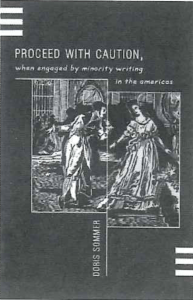A Review of Proceed with Caution, When Engaged by Minority Writing in the Americas
 Proceed With Caution, When Engaged by Minority Writing in the Americas
Proceed With Caution, When Engaged by Minority Writing in the Americas
by Doris Sommer
(Harvard University Press, 1999)
Highly specialized, uninspired, and repetitive, most literary criticism today has very little to offer readers outside of its discipline. Doris Sommer’s latest book, however, speaks to readers well beyond the usual community of scholars and academics. Witty, urgent, and accessible, Proceed with Caution steers away from the trite conventions of contemporary criticism and engages its audiences not only on an intellectual plane but an ethical one as well. Rejecting jargon without sacrificing conceptual sophistication, the book focuses on the different strategies and resistances employed by minority writers when faced with audiences all too eager to devour their stories. Rather than performing empty-handed theoretical maneuvers, Sommer solidly and unambiguously challenges our idea of reading as a form of escape. As I followed each of the book’s committed readings, I was struck by their clean elegance: Sommer displays a nitid virtuosity.
All this said, Proceed with Caution is still a demanding book. Demanding not because it requires mastery over a large body of criticism, but because it demands an ethical commitment from its audience. Each of the chapters consistently asked me to reevaluate my role and expectations as a reader. Books are not transparent, Sommer warns. Authors may cheat, lie, refuse, demand. I found it impossible to think of reading as a one-sided exchange–to think of myself as detached and removed from what is happening on the page–after following Sommer’s argument.
Focusing on literature from the entire continent, this book is a prime example of the impact American Studies can have as a discipline. What might at first seem like an eclectic reading list–El Inca Garcilaso, Walt Whitman, Cirilo Villaverde, and Toni Morrison, for example–comes together smoothly, providing the reader with a web of interacting interpretations: gestures, moves, resistances mirrored across space. Sommer employs a new understanding of “America,” a continent with shifting borders and constantly migrating populations, making us realize, for example, that Black people in this country are not the only African-Americans and that these days the United States is as much a part of Latin America as Mexico or Puerto Rico. With all the current talk about globalization and post-nationalism, Sommer’s book reminds us that the real challenge is to acknowledge the nation’s still tangible influence without letting its borders restrict us.
Proceed with Caution is also, in many ways, a direct response to the United States’ increasingly diverse population. By paying attention to accentuated voices, lips that refuse to mouth words properly, that bend and distort language, making it their own, Sommer confronts models of democracy that demand assimilation and conformity from their citizens. As a person of color and a relatively new immigrant, I was struck by the relevance that a book putatively about literature had to current political and social debates. Continued assaults on Black and Latin@ communities–whether through educational, migratory or, penal legislation–serve as a reminder that projects like Sommer’s are not only intellectual exercises but timely interventions. Ultimately, her “particularism” reminds us that democracy can negotiate difference without having to erase it.
Joaquin Terrones is a graduate student in the Spanish section of the Romance languages and Literatures Department. His areas of interest include the Caribbean and the Baroque.
Related Articles
Forum on U.S. Hispanics in Madrid
The Trans-Atlantic Project, an academic initiative to study the cultural interactions between Europe, the U.S. and Latin America has been invited by Casa de América, Madrid, to present a …
Cuba Study Tour
Waiting at José Marti International Airport for the first Harvard students to arrive for January’s DRCLAS Cuba Study Tour, my companion, a theater critic at Casa de las Américas, commented to me …
The Soulfulness of Black and Brown Folk
And so, by faithful chance, the negro folksong – the rhythmic cry of the slave – stands to-day not simply as the sole American music, but as the most beautiful expression of human experience …




